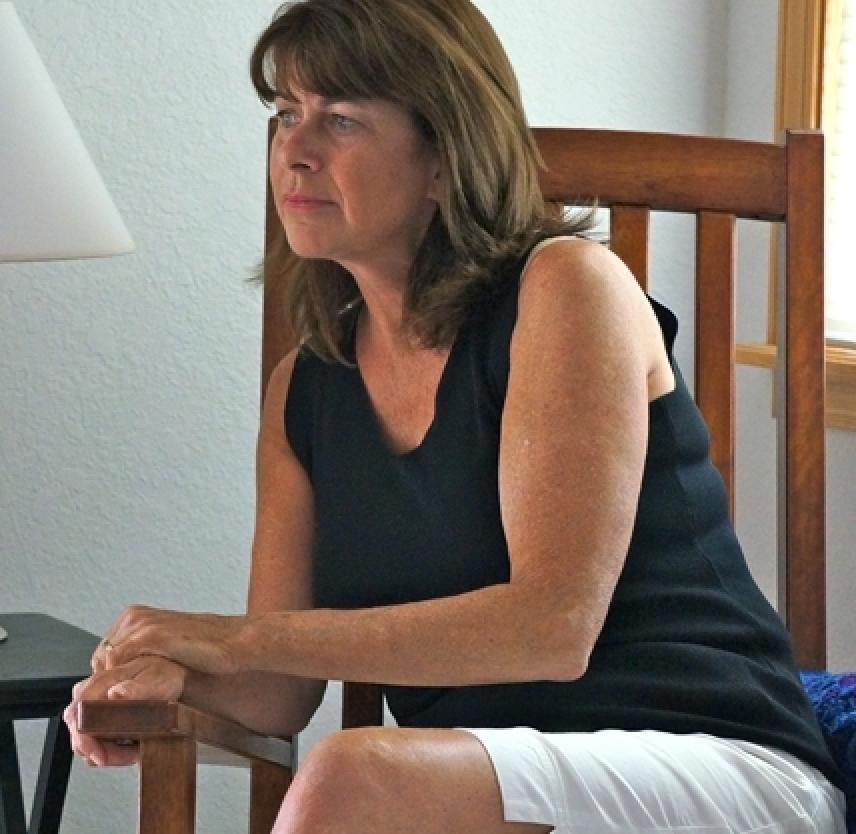
Just two months after Hugh’s crash, I was helping him get ready to go for a walk with his friend, Kevin. Kevin is one of Hugh’s best friends and he also happens to be a physical therapist. He saw me putting on Hugh’s sneakers and asked, “What are you doing?”
“I’m putting on his sneakers,” I said. “He can’t do it because he’s not flexible and it makes him dizzy to look down.”
“Of course he can do it,” Kevin said. He showed Hugh how to put his foot on a chair to put his sneaker on. This relieved the pressure on his hamstring and Hugh did not get dizzy because he was looking across rather than down.
I sat there stunned. Later, Kevin told me I should let Hugh do more things for himself rather than stepping in all the time to help. “He’s a tough guy!” he assured me.
On another occasion, while I was telling a friend about how sad I was that Hugh could not do the things he wanted, she said, “You need an empathectomy!” There’s no such word, but there is now! She was right. I was lucky enough to have friends who spoke the truth to me and encouraged me to find ways to help Hugh become independent. I needed to cut out some of this empathy. It was tearing me apart and not helping him. I was wallowing in Hugh’s misery when he needed me to be steady. Before Hugh could feel confident trying new things, he had to hear me say, “You can do this,” rather than, “You can’t do that. I’ll do it for you.”
How do you know if you need an empathectomy?
- Do you feel your loved one’s exhaustion, heaviness, and weight of his injury?
- Do you step in and take over because you can’t bear to see your loved one struggle with simple activities?
- Do you feel your loved one’s pain and sense of loss like it’s happening to you?
Empathy is the ability to understand another’s feelings so deeply that you “walk in that person’s shoes.” It is a wonderful quality that helps people connect through compassion. But too much empathy doesn’t help in a caregiving situation when it affects the care you give. Too much empathy can cause a caregiver to wallow in self-pity while perpetuating a victim mindset, and it could even spill over into commiseration punctuated by a silent message to the person with the TBI that says: I can’t do anything. I won’t improve. I’ll never get better.
A caregiver who is reasonably empathetic, but who follows a more therapeutic approach will wait as long as it takes for a loved one to master each small step while offering verbal encouragement, compensatory strategies, and tips for success. This kind of coaching usually results in both parties feeling a sense of connection and accomplishment, and these small successes, over time, will boost each person’s emotional sense of well-being.
There’s another reason that over-empathizing can get sticky. As caregivers, we may want to fix everything for the one we love, but that may be impossible. If we submerse ourselves too deeply into our loved one’s world, we may be in danger of losing our own independence, our own individuality, and eventually, ourselves. To best care for the ones we love, we must find our own solid center from which to give and receive in healthy ways.

Comments (5)
Please remember, we are not able to give medical or legal advice. If you have medical concerns, please consult your doctor. All posted comments are the views and opinions of the poster only.
Anonymous replied on Permalink
Anonymous replied on Permalink
Anonymous replied on Permalink
Anonymous replied on Permalink
Anonymous replied on Permalink